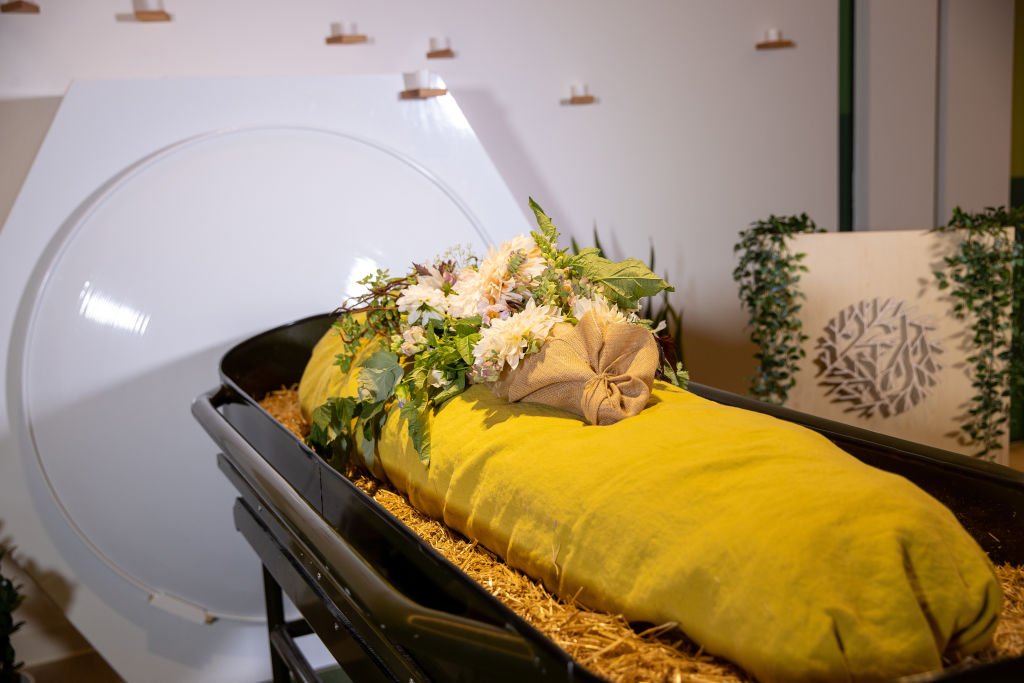Turning bodies into soil
As cemeteries run short on space, some people are turning to human composting to dispose of their remains

A free daily email with the biggest news stories of the day – and the best features from TheWeek.com
You are now subscribed
Your newsletter sign-up was successful
As cemeteries run short on space, some people are turning to human composting to dispose of their remains. Here's everything you need to know:
What is human composting?
It's an environmentally friendly way of burying people, in which human remains are turned into rich soil. Also known as natural organic reduction, the process takes roughly two months to decompose a body, producing soil which loved ones might use to plant flowers, vegetables, or trees. In 2019, Washington became the first state to allow human composting, and hundreds of people have chosen this means of disposing of their remains. Oregon, Colorado, Vermont, and New York followed with their own legalization. California plans to allow human composting by 2027. As urban cemeteries around the world near capacity, cremation rates have soared, but many people concerned about climate change and the environment don't want their incinerated remains to release hundreds of pounds of carbon dioxide and toxic chemicals. A 2022 survey by the National Funeral Directors Association found that 60 percent of Americans are open to "green" end-of-life arrangements.
Is burial still commonplace?
Not nearly to the extent it was just a few decades ago. In 2021, just 37 percent of Americans were buried, compared with roughly 90 percent in 1980. Many observant Christians, Jews, and Muslims still wish to be buried, in keeping with tradition and religious teachings. But for many people, burial is growing less and less practical. A casket burial costs about $8,000 on average, and a burial plot can cost thousands of dollars more; in crowded urban areas like New York City, a plot can cost up to $1 million. Cities are running out of cemetery space, forcing people to be buried hours away from where they lived. Acute cemetery-plot shortages are occurring in crowded areas throughout the world, as available land can't keep pace with the number of people dying every day.
The Week
Escape your echo chamber. Get the facts behind the news, plus analysis from multiple perspectives.

Sign up for The Week's Free Newsletters
From our morning news briefing to a weekly Good News Newsletter, get the best of The Week delivered directly to your inbox.
From our morning news briefing to a weekly Good News Newsletter, get the best of The Week delivered directly to your inbox.
What about cremation?
It's increasingly popular, usually costing $1,000 to $2,500. But incinerating a body uses enough fuel to fill an SUV's gas tank, and total cremations in the U.S. release about 360,000 metric tons of carbon dioxide every year; during the pandemic, Los Angeles was forced to suspend air-pollution rules because of the surging demand for cremating COVID victims. Cremations also release carbon monoxide and sulfur dioxide into the atmosphere, plus vaporized mercury from tooth-fillings, accounting for about 16 percent of total mercury emissions, according to the United Nations.
How are bodies composted?
A corpse is dressed in a biodegradable gown, typically made of cotton, and placed in a reusable, closed steel cylinder that's packed with biodegradable materials such as wood chips, alfalfa, and straw. At some facilities, loved ones can surround the body with flowers, notes, or other sentimental items. Air is pumped into the closed vessel, and microbes degrade the body and cause the vessel to get hot, with vents filtering the resulting gasses. "There are billions of microbial, living things in our digestive tracts," said Seth Viddal, who co-owns a human composting center in Colorado. "When our one life ceases, the life of those microbes does not cease." After about a month, workers sift out medical implants — such as pacemakers and hip replacements — and pulverize remaining bones. The remaining soil is left for another few weeks to settle, then it can be donated or returned in sacks to families, who can place it where they see fit.
Are there obstacles?
Yes. The Catholic Church has said that composting treats human remains as a "disposable commodity," arguing that it's "more appropriate for vegetable trimmings and eggshells than for human bodies." Other Christian, Jewish, and Muslim denominations have also expressed opposition. There are philosophical and emotional objections as well: For decades, the funeral industry has promoted the idea that expensive burials can protect loved ones from decomposition through embalming, sealed caskets, and even concrete vaults. Composting is a challenge to this concept, and embraces "dust to dust" on an accelerated timeline. It costs more than twice as much as cremation, ranging from $5,000 to $7,000 — about the same as burial. Availability is also an issue: For now, at least, U.S. human composting centers don't have close to the capacity to process a significant number of bodies.
What are the advantages?
The impact on the environment is dramatically lessened. Every year, U.S. casket burials use 30 million board feet of wood and nearly 2 million tons of concrete, steel, and other materials. They introduce 5.3 million gallons of embalming fluids such as formaldehyde, methanol, and ethanol into the earth each year. People who choose composting and other green alternatives — such as burial without a coffin — say they like the idea of returning to nature after they die. "I've always wanted to be a tree," said Democratic state Rep. Cristina Garcia, 45, who sponsored California's bill legalizing human composting. "The idea of having my family sitting under my shade one day — that brings a lot of joy."
A free daily email with the biggest news stories of the day – and the best features from TheWeek.com
Visiting the dead
Anthropologists say burying the dead is one trait that distinguishes humans from other apes. For some people, cemeteries offer a place to keep families close and pay respect to distant ancestors. But many space-squeezed cemeteries are questioning whether anyone is really visiting the graves of people who died in the 19th century. In some countries, it's common to move remains from a specific grave site to a communal area after 50 years or so. At an overcrowded cemetery in Jakarta, Indonesia, as many as six bodies, usually from the same family, can be stacked on top of one another in the space previously reserved for one body. Soil from human composting can be scattered like the ashes from cremation, but families can also create a different kind of memorial. After Sean Ovens, a police officer in Tacoma, Washington, died of suicide last summer, his mother, Roberta Vollendorff, had his remains composted and used the soil around a Sitka spruce tree on her property. "I can walk out to the tree that I've walked out to all these years, and my son is there," she said. "It's so comforting."
This article was first published in the latest issue of The Week magazine. If you want to read more like it, you can try six risk-free issues of the magazine here.
-
 Regent Hong Kong: a tranquil haven with a prime waterfront spot
Regent Hong Kong: a tranquil haven with a prime waterfront spotThe Week Recommends The trendy hotel recently underwent an extensive two-year revamp
-
 The problem with diagnosing profound autism
The problem with diagnosing profound autismThe Explainer Experts are reconsidering the idea of autism as a spectrum, which could impact diagnoses and policy making for the condition
-
 What are the best investments for beginners?
What are the best investments for beginners?The Explainer Stocks and ETFs and bonds, oh my
-
 How climate change is affecting Christmas
How climate change is affecting ChristmasThe Explainer There may be a slim chance of future white Christmases
-
 Why scientists are attempting nuclear fusion
Why scientists are attempting nuclear fusionThe Explainer Harnessing the reaction that powers the stars could offer a potentially unlimited source of carbon-free energy, and the race is hotting up
-
 Canyons under the Antarctic have deep impacts
Canyons under the Antarctic have deep impactsUnder the radar Submarine canyons could be affecting the climate more than previously thought
-
 NASA is moving away from tracking climate change
NASA is moving away from tracking climate changeThe Explainer Climate missions could be going dark
-
 What would happen to Earth if humans went extinct?
What would happen to Earth if humans went extinct?The Explainer Human extinction could potentially give rise to new species and climates
-
 Bacteria can turn plastic waste into a painkiller
Bacteria can turn plastic waste into a painkillerUnder the radar The process could be a solution to plastic pollution
-
 Florida has a sinking condo problem
Florida has a sinking condo problemUNDER THE RADAR Scientists are (cautiously) ringing the alarms over dozens of the Sunshine State's high-end high-rises
-
 Diamonds could be a brilliant climate solution
Diamonds could be a brilliant climate solutionUnder the radar A girl and the climate's best friend